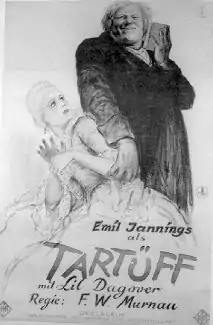| Tartuffe Herr Tartüff | |
|---|---|
 Film poster | |
| Directed by | F. W. Murnau |
| Written by | Carl Mayer |
| Produced by | Erich Pommer |
| Starring | |
| Cinematography | Karl W. Freund |
| Music by | Giuseppe Becce |
| Distributed by | UFA |
Release dates |
|
Running time | 4 reels |
| Country | Weimar Republic |
| Languages | |
Tartuffe (Herr Tartüff) is a German silent film produced by Erich Pommer for UFA and released in 1926. It was directed by F. W. Murnau, photographed by Karl Freund and written by Carl Mayer from Molière's original play. It was shot at the Tempelhof Studios in Berlin. Set design and costumes were by Robert Herlth and Walter Röhrig.
The film starred Emil Jannings as Tartuffe, Lil Dagover as Elmire and Werner Krauss as Orgon.
Based on the play Tartuffe, the film retains the basic plot, but Murnau and Mayer pared down Molière's play, eliminating most of the secondary characters and concentrating on the triangle of Orgon, Elmire and Tartuffe. They also introduced a framing device, whereby the story of Tartuffe becomes a film-within-a-film, shown by a young actor as a device to warn his grandfather about his unctuous but evil housekeeper.
Cast
- Emil Jannings – Tartüff
- Werner Krauss – Herr Orgon
- Lil Dagover – Elmire, Orgon's wife
- Hermann Picha – Old councilor
- Rosa Valetti – Housekeeper
- André Mattoni – Grandson
- Lucie Höflich – Dorine
- Camilla Horn – Uncredited
Restoration and home video
Like all Murnau's surviving films, Tartuffe is licensed by the Friedrich Wilhelm Murnau Foundation,[1] whose tinted restoration is distributed on home video with a piano score by Javier Pérez de Azpeitia. It has been released on DVD in the US (Kino Lorber) and in identical editions in the UK (Eureka/Masters of Cinema), France (mk2), Germany (Universum Film) and Spain (Divisa).[2] The FWMS restoration has also been released on Blu-ray in the UK by Eureka/MoC.[3]
In 2015, a new, longer and more accurate restoration with a full orchestral score was broadcast on Arte television, and as of April 2020 it is available on home video only in the U.S. via Kino Lorber’s Blu-ray reissue.[4]
Legacy
In retrospective reviews, critics commented on the film's mise-en-scene and praised the performances. Several critics noted the rarity of a comedy directed by Murnau, who was famous for the expressionist dramas.[5] Its humorous storyline and happy ending has rendered it a minor work in Murnau's filmography and has led film critic Jonathan Rosenbaum to call it "underrated."[6][7]
See also
References
- ↑ "DCP – Film distribution 09/2018 (PDF)" (PDF). Friedrich Wilhelm Murnau Foundation.
- ↑ "Tartuffe DVD comparison". DVDCompare.
- ↑ "Tartuffe Blu-ray comparison". DVDCompare.
- ↑ "Early Murnau: Five Films, 1921–1925". Criterion Forum.
- ↑ "Tartuffe - Movie ...." Rotten Tomatoes. 4 August 2021.
- ↑ Rosenbaum, Jonathan. "Tartuffe." Chicago Reader. 4 August 2021.
- ↑ Smith, Derek. "Review: F.W. Murnau’s Adaption of Molière’s Tartuffe on Kino Blu-ray." Slant Magazine. 29 April 2020. 4 August 2021.